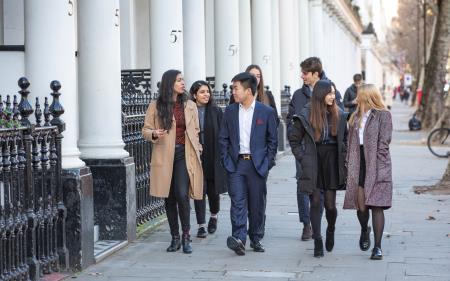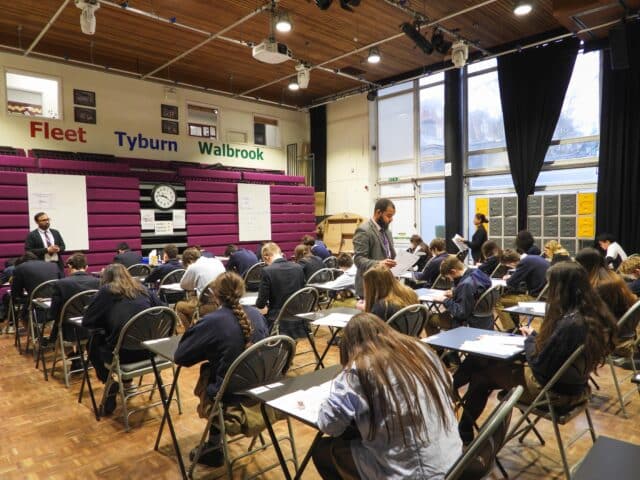Related articles
For A Level students, the autumn term of Upper Sixth (Year 13) is, perhaps, the most crucial, second only to their exams. On returning to school in September, students must hit the ground running as they draft and redraft their personal statements, complete the UCAS form, and finalise their university course choices – all whilst trying to keep up with their A Level studies.
During this formative period, students are faced with decisions that will have an impact on at least the next three or four years of their lives, and indeed further into adulthood, and it is crucial that they receive the right guidance and support.
We speak with Ms Sushma Bunger, Assistant Head of KPS Sixth Form, and Mr Habib Maroon, Teacher of Biology and UCAS Coordinator, to understand more about how KPS prepares students for life after A Levels.
-
For many students, having struggled to limit their A Level subjects to just three or four, the process of narrowing down the various undergraduate and university course options can seem overwhelming. What support is in place for students in those early stages as they start to research the options available?
Ms Bunger: One of the key things that distinguishes KPS is our exceptional tutor system. On joining KPS Sixth Form, all students are assigned a personal tutor who will meet with them fortnightly (weekly during critical periods), and will be their first point of contact for any academic or pastoral matters. Tutors play a vital role in helping students to research undergraduate course and university options, and this process starts early, at the beginning of Year 12. Tutors help their tutees to discover their interests and ambitions, explore potential career options, and decide what kinds of courses and universities they are aiming for. Tutors ensure their tutees have the right balance of realistic and aspirational choices on their UCAS form in order to maximise their chances of success. In addition to personal tutors, we have a dedicated UCAS team who are also on hand to support: Mr Habib Maroon, our UCAS Coordinator; Mr Morgan Jackson, who leads our Oxbridge support; Ms Deb D’Auria, who assists those applying for Ivy League universities; and myself as Assistant Head of KPS Sixth Form. And, of course, there is also our team of teachers and subject specialists who can provide specific advice on particular degree courses/universities.
-
How are students guided through the UCAS application process? Who assists with the Personal Statement which often needs to go through several drafts?
Ms Bunger: At the end of Year 12 (by which time students’ tutors will already have introduced them to the basics), we organise workshops to go through the UCAS form and Personal Statement in more detail. We provide students with information packs, including crib sheets and resources, to help them complete the UCAS form and structure the Personal Statement. Tutors will take the lead on Personal Statement writing during tutor periods at the end of Year 12 and beginning of Year 13. We also run Personal Statement clinics at lunchtimes for students who might need additional support.
Mr Maroon: In addition to the Personal Statement, an important (yet often over-looked) part of the UCAS form is the Reference section (to be completed by the school). One of my key responsibilities as UCAS Coordinator is to oversee the completion of these references, and we have developed an excellent methodology at KPS Sixth Form to ensure we provide a comprehensive, well-written, and thoughtful picture of the student. As we know from some university admissions tutors, a quality reference can really make a difference to a student’s application.
-
The application process for Oxford, Cambridge, and for most Medicine, Veterinary Medicine/Science, and Dentistry courses is a little more involved than for other universities/subjects. There is also an earlier UCAS deadline. Do we offer any additional preparation for Oxbridge and medical applications?
Mr Maroon: Earlier this term we heard from Mr Morgan Jackson who is running our Oxbridge club this year. Mr Jackson meets with our Oxbridge applicants once a week to discuss various philosophical topics and introduce students to key concepts, ideas, and schools of thought, helping them to develop the independent and critical thinking skills which are so vital for Oxbridge entrance tests and interviews. In addition, we organise additional mock interview practice for our Oxbridge and medical students to help them become confident in discussing and debating their subjects. For students applying for medicine, it is essential that they organise relevant work experience, and we partner with a company who can help to arrange this.
Ms Bunger: We also offer support for those looking to apply to universities in the US, which has become an increasingly popular destination for students in recent years. Ms Deb D’Auria, Teacher of Psychology, runs sessions to introduce students to the application process for Ivy League and US universities (which is very different to the UCAS system in the UK), and help them with their personal essays.
-
For some students, their choice of undergraduate degree is heavily informed by their future career aspirations. For others, the world of work still seems like a long way off. Does KPS Sixth Form offer any career guidance or counselling, or help with work experience?
Ms Bunger: In a normal year, we arrange careers advice and work experience for our students. In the January of Year 12, students have a Careers and Work Experience presentation, which is followed by two one-to-one interviews. The first interview focuses on students’ career aspirations. Students’ answers are analysed, and an individual career plan is created for them. Students then have a second follow-up interview where they meet with a work experience specialist who will help them find a placement within their field of interest. We offer students access to a huge network of contacts in and around London, and our students greatly benefit from the work experience opportunities they provide. The programme was disrupted by Covid, however, we hope to be able to resume this for our new Year 12 students in 2021!
Mr Maroon: In order to try and compensate for the disruption caused by Covid this year, Ms D’Auria has created a fantastic Enrichment Hub for our students on Firefly, helping them to access a variety of subject specific and inter-disciplinary webinars, lectures, seminars, courses, events and opportunities online. Although work experience is, of course, a great way to boost your CV, there are a number of different ways to show engagement with your subject outside of the A Level syllabus and make your personal statement stand-out. There are so many resources available online, and lots of events and lectures held by the London universities which we encourage our students to attend.
-
It is one thing to prepare students for top grades and to secure their university places, but how do we ensure that our students will make successful undergraduates as well? Do you prepare KPS students for life beyond the classroom?
Ms Bunger: This is, in fact, one of the core aims of KPS Sixth Form. We firmly believe that there is no point ‘spoon feeding’ our students to get great A Level grades and university places if they won’t then be able to cope with the demands of independent study at undergraduate level. PSHE is an essential part of the curriculum in Sixth Form, and many of these sessions are dedicated to developing important life skills. We also offer academic support sessions to help students develop useful study techniques, from writing skills and essay planning, to organisation and time management. We want our students to leave KPS as confident, independent learners, equipped with knowledge and skills that will translate into both university and career success later on.






